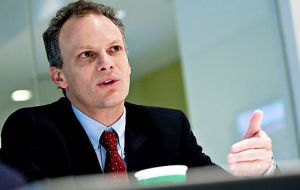MercoPress. South Atlantic News Agency
IMF insists with gloomy forecasts for Argentina's economy this year and 2016
 “Argentina maintained significant financial imbalances, following an extended period of fiscal expansion”, the IMF claims.
“Argentina maintained significant financial imbalances, following an extended period of fiscal expansion”, the IMF claims.  The Economic Perspectives: The Americas, was penned by Western Hemisphere director Alejandro Werner and Roberto Cardarelli, IMF Chile mission chief
The Economic Perspectives: The Americas, was penned by Western Hemisphere director Alejandro Werner and Roberto Cardarelli, IMF Chile mission chief The International Monetary Fund (IMF) has repeated its forecast of a 0.3% drop in Argentine GDP over the course of 2015, while recommending a devaluation of the Peso and austerity measures in order to stimulate growth in the economy.
In the report Economic Perspectives: The Americas, penned by Western Hemisphere director of the body Alejandro Werner and Roberto Cardarelli, IMF Chile mission chief, the international organization reiterated its gloomy prediction for Argentina's economy.
Next year, 2016, according to the report, also promises little growth, with an increase of just 0.1% forecast.
“Argentina maintained significant financial imbalances, following an extended period of fiscal expansion which has impacted hard on the financing of the Central Bank,” the IMF claims.
The body adds that restrictions on trade and the exchange market have also created a large gap between the official and black market dollar rates. It is admitted, however, that the gap has stabilized since the end of 2014 between 40 and 50%, with inflation still in double digits but falling.
Looking forward to the future, adverse trading conditions, particularly due to the drop in international soy prices, weak economic activity in Brazil and the strengthening of the Real, according to the report, have generated more unfavorable conditions for growth in the Argentine economy, with a contraction of 0.3% expected for the current year.
While the organization believes that the country's economic travails are not as extreme as those faced in Venezuela, it affirms that Argentina would need a combination of measures similar to the Caribbean nation, with ”tighter macroeconomic policies, a weaker exchange rate (that is to say, devaluation) and fewer microeconomic distortions in order to lay the foundations for a return to stability and growth.”
The IMF estimates inflation at 23.9% for last year, while projecting a deceleration in price rises to 20.5% for 2015 and 2016. However, a worsening of the fiscal deficit is also predicted, with the current account estimated to be in the red to the tune of 1.7% of GDP this year and 1.8% the following year.
The primary fiscal deficit (without interest payments on debt) is calculated at 1.6% of GDP for 2015, falling to 1.4% the next year.




Top Comments
Disclaimer & comment rules-

-

-

Read all comments--------------------------------------------------------------------------------------------
Apr 30th, 2015 - 01:39 am 0But,…. But,…. “A man,…. We have an Empire….we won the WAR ... Don´t we?.”
So much for the WON DECADE!
Now is the time to pay for it.
It is good that the IMF can only “recommend” the measures it would like to see implemented in Argentina.
Apr 30th, 2015 - 05:25 am 0When countries are to their necks into debt, the IMF imposes devaluation and austerity--recessive recipes that haven't changed through the years in spite of failing time after time (now not only in Latin America but in Europe too).
During the neo-liberal experiment of the 1990s, Argentina was considered an A-plus pupil, following to the letter the IMF's direction. The country was the darling of the credit rating agencies.
When the 2001 crisis hit, the IMF recommended further austerity measures that led Argentina straight to default.
In 2006, Nestor Kirchner paid off the country's debt to the organism, recovering the country's autonomy to make its own economic decisions.
The current government knows better than following the advise of such a failed organization.
Don't usually correct Argies spelling , but in your case I will make an exception. Organism is a single cell form amonst other things like plants, whereas Organisation is the word you should be using. Hope that clears things up, I know that Mercopress get it wrong as well, must be a Latino thing. Pray tell us why the “ crisis” hit in 2001, it couldn't be mismangement or corruption could it? Not the Government was it?
Apr 30th, 2015 - 06:06 am 0Commenting for this story is now closed.
If you have a Facebook account, become a fan and comment on our Facebook Page!